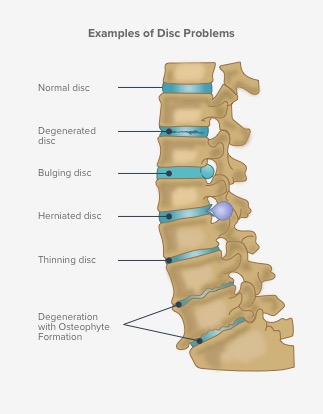Cervical Spondylosis
What Is Cervical Spondylosis?
Cervical spondylosis is a general term for the age-related degeneration of your cervical spine, which is located in your neck. Over time, the gel-like discs in your spine become less hydrated, causing the disc to lose height. In some cases, disc degeneration can lead to tears and weak spots in the outer part of the disc, allowing the soft inner part of the disc to leak out. This causes the disc to bulge which can affect nearby nerves, causing pain.
Disc degeneration also makes it more likely that the vertebrae protected by these discs will rub together, causing more pain. Also, the more worn down these discs become, the more susceptible you will be to issues like bone spurs and stiff ligaments.

Symptoms
The symptoms of a degenerative disc vary from person to person. Many people with deterioration have no pain, while others may experience pain so intense that it interferes with daily activities. When symptoms do occur, they typically include pain and stiffness in the neck and often often starts in one of three ways:
- a major injury followed by sudden and unexpected pain
- a trivial injury followed by sudden neck pain
- pain that starts gradually and gets progressively worse
Sometimes, cervical spondylosis results in a narrowing of the space needed by the spinal cord and the nerve roots that pass through the spine to the rest of your body. If the spinal cord or nerve roots become pinched, you might experience:
- Tingling, numbness and weakness in extremities (arms, hands, legs or feet)
- Grinding or popping noise or sensation when you turn your neck
- Difficulty walking or loss of balance
- Muscle weakness
- Headaches that sometimes overrides pain and/or stiffness, and become the dominant symptom
- Pain that increases when you sit, stand, sneeze, cough or tilt your head
- Dizziness
- Numbness
- Writing and related activities can become problematic with “numb, clumsy hands”
- Muscle spasms in the neck and shoulders
- Loss of bladder control
Note: Seek medical attention if you notice a sudden onset of numbness or weakness, or loss of bladder or bowel control.
Causes
Age-related issues are the main causes of cervical spondylosis. These issues are explored below in more detail.
Dehydrated discs
Discs act like cushions between the vertebrae. By the age of forty, your discs may begin drying out and shrinking, allowing for increased bone-on-bone contact between vertebrae.
Herniated discs
Age also affects the strength of the outer layer of your discs. Cracks can appear, allowing the inner material to come out. These can press on the spinal cord and the nerve roots.
Bone spurs
Disc degeneration can result in the spine producing extra bone in a misguided effort to strengthen the spine. Bone spurs can pinch the spinal cord and nerve roots, too.
Stiff ligaments
Ligaments are cords of tissue connecting your bones. Due to age-related degeneration, spinal ligaments can stiffen, making that your neck less flexible.
Follow Us
Request An Appointment
Address: 3273 Claremont Way, Ste. 201, Napa, CA 94558
Phone: 707-603-1042
